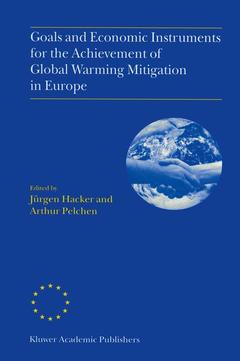Description
Goals and Economic Instruments for the Achievement of Global Warming Mitigation in Europe, Softcover reprint of the original 1st ed. 1999
Proceedings of the EU Advanced Study Course held in Berlin, Germany, July 1997
Coordinators: Hacker Jürgen, Pelchen Arthur
Language: English
Subjects for Goals and Economic Instruments for the Achievement of...:
Keywords
Acid rain; Climate Change; Climatology; Co2 Emission; Global warming; Greenhouse gas; Rain
Publication date: 10-2012
466 p. · 16x24 cm · Paperback
466 p. · 16x24 cm · Paperback
Description
/li>Contents
/li>
Climate change poses important challenges to research and policy. Within three decades, an issue that was initially confined to the attention of a few scientists became the topic of large-scale research programmes, national and European policies and an international Convention. While significant uncertainties remain on the timing and scale of the changes to be expected and of their impacts, an appreci ation emerged of the high ecological, economic, political and social stakes involved and lead to governmental, business and citizens' initiatives. After focusing on the understanding of climate processes and the possible impacts of climate change on ecosystems, European research - and international research more generally - started addressing also the social, economic and policy causes of and responses to climate change. In the meantime, local, national and European measures started being developed to mitigate carbon dioxide emissions, a European target was agreed to achieve the stabilization of carbon dioxide by 2000 at the levels of 1990, the Framework Convention on Climate Change (FCCC) was adopted and was followed by its Kyoto Protocol.
Section I. State of Scientific Knowledge in Climate Change.- Climate and its Influencial Factors, especially the Anthropogene Enhancement of the Greenhouse Effect and its Possible Impacts -Results of the Second Assessment Report of the IPCC.- The IPCC/OECD/IEA Greenhouse Gas Inventories Programme: International Methods for the Estimation, Monitoring and Verification of GHG Emission Inventories.- Necessities and Problems of Coupling Climate and Socioeconomic Models for Integrated Assessments Studies from an Economist’s Point of View.- Climate Change and Integrated Assessment: The Tolerable Windows Approach (The ICLIPS Project: Integrated assessment of CLImate Protection Strategies).- Climate Change and Global Change: The Syndrome Concept (The QUESTIONS Project: QUalitativE Dynamics of Syndromes and TransiTION to Sustainibility).- Section II. From Scientific Results to the Political Agenda.- A Comparison of GHG Inventories and Reduction Goals for Different Countries in Europe.- Allocating Emission Reduction Targets in the European Union -Issues and Proposals.- The EU Position in the Negotiation Process towards a Protocol on the Limitation and Reduction of Greenhouse Gas Emissions.- Section III. Political and Economical Instruments -An Overview — Introduction.- The Range of Possible Political and Economical Instruments for the Mitigation of Global Climate Change.- A Framework for the Evaluation of Political and Economical Instruments for Global Warming Mitigation.- — Voluntary Approaches —.- Global and European Voluntary Approaches in Mitigation of Greenhouse Gas Emissions on Municipal Level and their Results.- Voluntary Commitments to Mitigate Greenhouse Gas Emissions -The Example of German Industry and Trade.- Voluntary Agreements in Climate Protection —Experiences in Germany and Future Perspectives.- — Taxes —.- Carbon and Energy Taxes in OECD Countries.- European Commission’s Experience in Designing Environmental Taxation for Energy Products.- Limits of the Tax Approach for Mitigating Global Warming.- — Joint Implementation —.- Activities Implemented Jointly (AIJ) as an Instrument for the Mitigation of Global Warming.- Practical Examples of Activities Implemented Jointly (AIJ) in Costa Rica.- Problems and Limitations of AIJ and the JI Potential from the Perspective of a German Project Broker.- Section IV. Tradeable Emission Permits — A Practable Example: Tradeable Emission Permits for SO2.- US Experience with Tradeable SO2 allowances.- A European Model for Tradeable SO2-Emission Permits.- — Design of a CO2 Emission System.- Efficiency, Equity and Optimal Carbon Abatement.- Posibilities of an EU System of CO2 Emission Permits.- Launching a Plurilateral Greenhouse Gas Emissions Trading System — the UNCTAD-Earth Council Initiative.- Tradeable Emissions Permits and the WTO.- — Perspective of a CO2 Emission System —.- Status of Discussion and Negotiation for a System of Tradeable CO2 Emission Permits within the UNFCCC.- The United States Proposal for an International CO2 Emissions Trading System.- — Emission Quota Trade — A Simulation Experiment.- Results of the Emission Quota Trade Simulation Experiment by the Participants.- Section V. Comparison of Instruments and Summary.- Assessing the Different Instruments in Climate Change Mitigation from the Perspective of Economics.- Assessment of the Different Economic Instruments by the Participants.- Selected Results of the Working Groups.- List of Authors.- List of Participants.- Colour Plate Section.
© 2024 LAVOISIER S.A.S.




